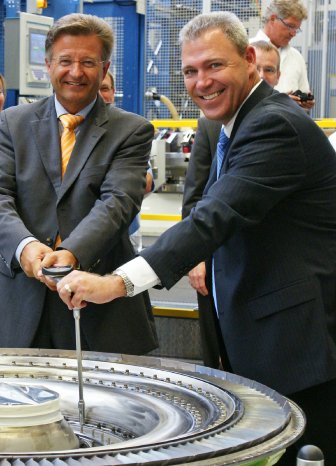MTU's chief executive Egon Behle explained: "The GEnx, which powers the Boeing 787 Dreamliner and has been selected as the exclusive po-werplant for the Boeing 747-8, is one of our most important commercial engine programs for widebodies down the road. That's why we've set up highly advanced dedicated production lines for our components at the company's Munich facility." The numbers prove him right: So far, 1,300 orders and options have been received for the new GE engine. Rhonda Sample said: "MTU has been a valued associate over the years, and we are pleased that this last-bolt ceremony marks the continuation of that as-sociation."
MTU joined the GEnx program as a risk- and revenue-sharing participant three years ago and holds a program share of 6.65 percent. The company has taken on responsibility for development, production and assembly of the turbine center frame, or TCF for short. The original TCF design has meanwhile been optimized by improving the hot-gas ducts and reducing the module's weight. The TCF is the transition duct between the high-pressure turbine and the low-pressure turbine. Due to its location in the engine, it is exposed to extreme conditions in operation: It ducts the hot gases exiting the high-pressure turbine at temperatures of more than 1,000 degrees Centigrade along structural components and pipes towards the low-pressure turbine, keeping aerodynamic losses at a minimum. Said Behle: "Production of this highly-engineered component must meet very stringent requirement."
GE Aviation, an operation unit of GE, is a world-leading provider of jet en-gines, components and integrated systems for commercial and military aircraft.


